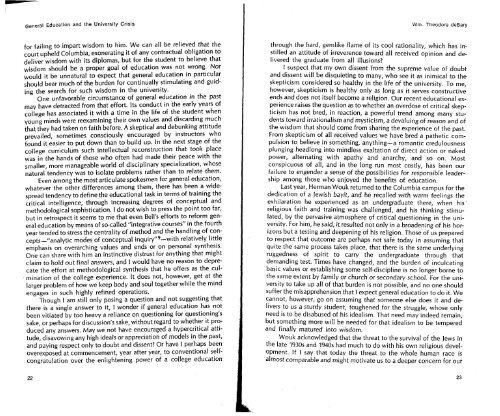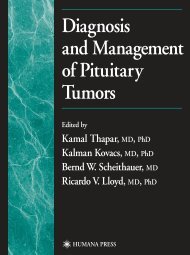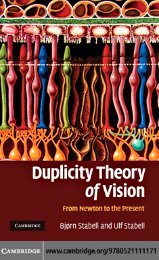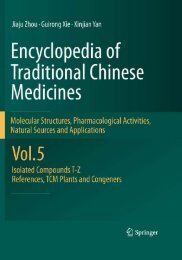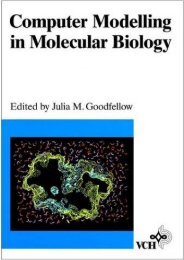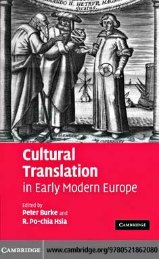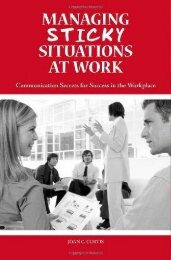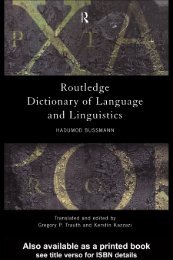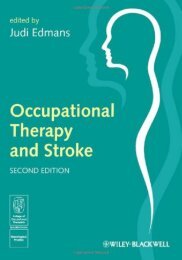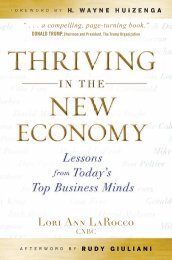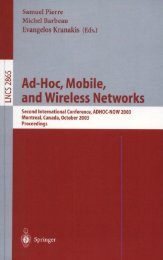The Philosophy of the Curriculum-The Need for General ...
The Philosophy of the Curriculum-The Need for General ...
The Philosophy of the Curriculum-The Need for General ...
Create successful ePaper yourself
Turn your PDF publications into a flip-book with our unique Google optimized e-Paper software.
<strong>General</strong> Education and <strong>the</strong> University CrisisWm. <strong>The</strong>odore deBary<strong>for</strong> failing to .impart wisdom to him. We can all be relieved that <strong>the</strong>court upheld Columbia, exonerating it <strong>of</strong> any contractual obligation todeliver wisdom with its diplomas, but <strong>for</strong> <strong>the</strong> student to believe thatwisdom should be a proper goal <strong>of</strong> education was not wrong. Norwould it be unnatural to expect that general education in particularshould bear much <strong>of</strong> <strong>the</strong> burden <strong>for</strong> continually stimulating and guiding<strong>the</strong> search <strong>for</strong> such wisdom in <strong>the</strong> university.One unfavorable circumstance <strong>of</strong> general education in <strong>the</strong> pastmay have detracted from that ef<strong>for</strong>t. Its conduct in <strong>the</strong> early years <strong>of</strong>college has associated it with a time in <strong>the</strong> life <strong>of</strong> <strong>the</strong> student whenyoung minds were reexamining <strong>the</strong>ir own values and discarding muchthat <strong>the</strong>y had taken on faith be<strong>for</strong>e. A skeptical and debunking attitudeprevailed, sometimes consciously encouraged by instructors wh<strong>of</strong>ound it easier to put down than to build up. In <strong>the</strong> next stage <strong>of</strong> <strong>the</strong>college curriculum such intellectual reconstruction that took placewas in <strong>the</strong> hands <strong>of</strong> those who <strong>of</strong>ten had made <strong>the</strong>ir peace with <strong>the</strong>smaller, more manageable world <strong>of</strong> disciplinary specialization, whosenatural tendency was to isolate problems ra<strong>the</strong>r than to relate <strong>the</strong>m.Even among <strong>the</strong> most articulate spokesmen fo: general education,whatever <strong>the</strong> o<strong>the</strong>r differences among <strong>the</strong>m, <strong>the</strong>re has been a widespreadtendency to define <strong>the</strong> educational task in terms <strong>of</strong> training <strong>the</strong>critical intelligence, through increasing degrees <strong>of</strong> conceptual andmethodological sophistication. I do not wish to press <strong>the</strong> point too far,but in retrospect it seems to me that even Bell's ef<strong>for</strong>ts to re<strong>for</strong>m generaleducation by means <strong>of</strong> so-called "integrative courses" in <strong>the</strong> fourthyear tended to stress <strong>the</strong> centrality <strong>of</strong> method and <strong>the</strong> handling <strong>of</strong> concepts-"analyticmodes <strong>of</strong> conceptual inquiryUg-with relatively littleemphasis on overarching values and ends or on personal syn<strong>the</strong>sis.One can share with him an instinctive distrust <strong>for</strong> anything that mightclaim to hold out final answers, and I would have no reason to deprecate<strong>the</strong> ef<strong>for</strong>t at methodological syn<strong>the</strong>sis that he <strong>of</strong>fers as <strong>the</strong> culmination<strong>of</strong> <strong>the</strong> college experience. It does not, however, get at <strong>the</strong>larger problem <strong>of</strong> how we keep body and soul toge<strong>the</strong>r while <strong>the</strong> mindengages in such highly refined operations.Though I am still only posing a question and not suggesting that<strong>the</strong>re is a single answer to it, I wonder if general education has notbeen vitiated by too heavy a reliance on questioning <strong>for</strong> questioning'ssake, or perhaps <strong>for</strong> discussion's sake, without regard to whe<strong>the</strong>r it producedany answers. May we not have encouraged a hypercritical attitude,disavowing any high ideals or appreciation <strong>of</strong> models in <strong>the</strong> past,and paying respect only to doubt and dissent? Or have I perhaps beenoverexposed at commencement, year after year, to conventional selfcongratulationover <strong>the</strong> enlightening power <strong>of</strong> a college educationthrough <strong>the</strong> hard, gemlike flame <strong>of</strong> its cool rationality, which has instilledan attitude <strong>of</strong> irreverence toward all received opinion and delivered<strong>the</strong> graduate from all illusions?I suspect that my own dissent from <strong>the</strong> supreme value <strong>of</strong> doubtand dissent will be disquieting to many, who see it as inimical to <strong>the</strong>skepticism considered so healthy in <strong>the</strong> life <strong>of</strong> <strong>the</strong> university. To me,however, skepticism is healthy only as long as it serves constructiveends and does not itself become a religion. Our recent educational experienceraises <strong>the</strong> question as to whe<strong>the</strong>r an overdose <strong>of</strong> critical skepticismhas not bred, in reaction, a powerful trend among many studentstoward irrationalism and mysticism, a devaluing <strong>of</strong> reason and <strong>of</strong><strong>the</strong> wisdom that should come from sharing <strong>the</strong> experience <strong>of</strong> <strong>the</strong> past.From skepticism <strong>of</strong> all received values we have bred a pa<strong>the</strong>tic compulsionto believe in something, anything-a romantic credulousnessplunging headlong into mindless exaltation <strong>of</strong> direct action or nakedpower, alternating with apathy and anarchy, and so on. Mostconspicuous <strong>of</strong> all, and in <strong>the</strong> long run most costly, has been ourfailure to engender a sense <strong>of</strong> <strong>the</strong> possibilities <strong>for</strong> responsible leadershipamong those who enjoyed <strong>the</strong> benefits <strong>of</strong> education.Last year, Herman Wouk returned to <strong>the</strong> Columbia campus <strong>for</strong> <strong>the</strong>dedication <strong>of</strong> a Jewish bayit, and he recalled with warm feelings <strong>the</strong>exhilaration he experienced as an undergraduate <strong>the</strong>re, when his'religious faith and training was challenged, and his thinking stimulated,by <strong>the</strong> pervasive atmosphere <strong>of</strong> critical questioning in <strong>the</strong> university.For him, he said, it resulted not only in a broadening <strong>of</strong> his horizonsbut a testing and deepening <strong>of</strong> his religion. Those <strong>of</strong> us preparedto respect that outcome are perhaps not safe today in assuming thatquite <strong>the</strong> same process takes place, that <strong>the</strong>re is <strong>the</strong> same underlyingruggedness <strong>of</strong> spirit to carry <strong>the</strong> undergraduate through thatdemanding test. Times have changed, and <strong>the</strong> burden <strong>of</strong> inculcatingbasic values or establishing some self-discipline is no longer borne to<strong>the</strong> same extent by family or church or secondary school. For <strong>the</strong> universityto take up all <strong>of</strong> that burden is not possible, and no one shouldsuffer <strong>the</strong> misapprehension that I expect general education to do it. Wecannot, however, go on assuming that someone else does it and deliversto us a sturdy student, toughened <strong>for</strong> <strong>the</strong> struggle, whose onlyneed is to be disabused <strong>of</strong> his idealism. That need may indeed remain,but something more will be needed <strong>for</strong> that idealism to be temperedand finally matured into wisdom.Wouk acknowledged that <strong>the</strong> threat to <strong>the</strong> survival <strong>of</strong> <strong>the</strong> Jews in<strong>the</strong> late 1930s and 1940s had much to do with his own religious development.If I say that today <strong>the</strong> threat to <strong>the</strong> whole human race isalmost comparable and might motivate us to a deeper concern <strong>for</strong> our


